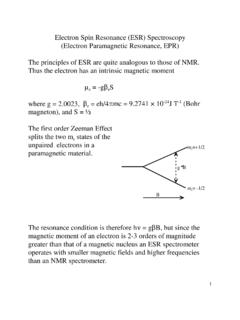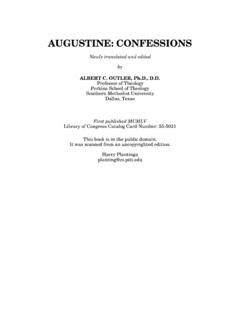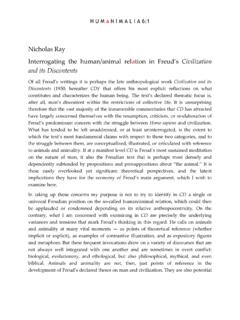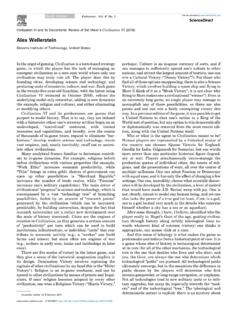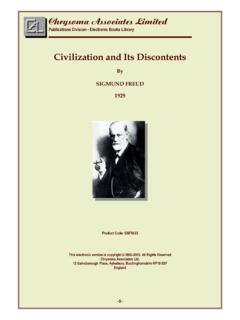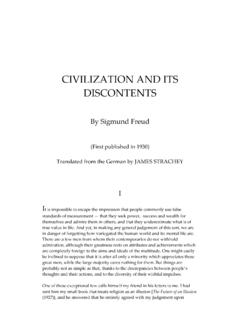Transcription of Technology and Its Discontents: On the Verge of the …
1 Technology and Its Discontents: On the Verge of the PosthumanJoel DinersteinAmerican Quarterly, Volume 58, Number 3, September 2006, pp. 569-595(Article)Published by The Johns Hopkins University PressDOI: additional information about this article Access provided by Georgetown University Library (24 Oct 2013 18:02 GMT) |569 Technology and Its Discontents 2006 The American Studies AssociationTechnology and Its Discontents: On the Verge of the PosthumanJoel DinersteinImmediately after 9/11, a Middle East correspondent for The Nation sum-marized the coming war on terrorism as [their] theology versus [our] Technology , the suicide bomber against the nuclear power.
2 1 His state-ment missed the point: Technology is the American theology. For Americans, it is not the Christian God but Technology that structures the American sense of power and revenge, the nation s abstract sense of well-being, its arrogant sense of superiority, and its righteous justification for global dominance. In the introduction to Technological Visions, Marita Sturken and Douglas Thomas declare that in the popular imagination, Technology is often synonymous with the future, but it is more accurate to say that Technology is synonymous with faith in the future both in the future as a better world and as one in which the United States bestrides the globe as a has long been the unacknowledged source of European and Euro-American superiority within modernity, and its underlying mythos always traffics in what James W.
3 Carey once called secular religiosity. 3 Lewis Mumford called the American belief system mechano-idolatry as early as 1934; a few years later he deemed it our mechano-centric religion. David F. Noble calls this ideology the religion of Technology in a work of the same name that traces its European roots to a doctrine that combines millenarian-ism, rationalism, and Christian redemption in the writings of monks, explor-ers, inventors, and NASA scientists. If we take into account the functions of religion and not its rituals, it is not a deity who insures the American future but new technologies: smart bombs in the Gulf War, Viagra and Prozac in the pharmacy, satellite TV at home.
4 It is not social justice or equitable eco-nomic distribution that will reduce hunger, greed, and poverty, but fables of abundance and the rhetoric of technological utopianism. The United States is in thrall to techno-fundamentalism, in Siva Vaidhyanathan s apt phrase; to Thomas P. Hughes, a god named Technology has possessed Americans. Or, as public policy scholar Edward Wenk Jr. sums it up, we are .. inclined to equate Technology with civilization [itself ]. 4| 570 American QuarterlyTechnology as an abstract concept functions as a white mythology. Yet schol-ars of whiteness rarely engage Technology as a site of dominant white cultural practices (except in popular culture), and scholars of Technology often sidestep the subtext of whiteness within this mythos.
5 The underlying ideology and cultural practices of Technology were central to American studies scholarship in its second and third generations, but the field has marginalized this critical framework; it is as if these works of (mostly) white men are now irrelevant to the field s central concerns of race, class, gender, sexuality, and ethnic identity on the one hand, and power, empire, and nation on the other. In this essay I will integrate some older works into the field s current concerns to situate the current posthuman discourse within an unmarked white tradition of technological utopianism that also functions as a form of social evasion. By the conclusion, I hope to have shown that the posthuman is an escape from the is an important moment to grapple with the relationship of technol-ogy and whiteness since many scientists, inventors, and cognitive philosophers currently hail the arrival of the posthuman.
6 This emergent term represents the imminent transformation of the human body through GNR technolo-gies G for genetic engineering or biotechnology, N for nanotechnology, and R for robotics. The posthuman, as N. Katherine Hayles defined it in How We Became Posthuman (2000), implies not only a coupling with intelligent machines but a coupling so intense and multifaceted that it is no longer pos-sible to distinguish meaningfully between the biological organism and the informational circuits in which the organism is enmeshed. To be reductive, the posthuman envisions the near future as one in which humans are cyborgs in which the human organism is, for all practical purposes, a networked being composed of multiple human-machine interfaces.
7 Underlying cultural beliefs in technological determinism matched with the inalienable right of consumer desire will soon produce what even cautious critics call a social transformation at the level of the individual body, as consumers purchase genetic enhance-ments (to take one example). In other words, steroids, cloning, gene mapping, and surgical implants are just the tip of an iceberg that, when it melts, will rebaptize human beings as J. Mitchell calls this new self-concept Me++ a pun on the computer language C++ and claims this future is already present. When Mitchell claims to routinely exist in the condition .. [of ] man-computer symbiosis, or that he now interact[s] with sensate, intelligent, intercon-nected devices scattered throughout my environment, who can argue with him?
8 An eminent design theorist and urban planner at MIT, Mitchell breezily |571 Technology and Its Discontentsdescribes a near future of high-tech wearables with implanted computers ( , clothes, eyeglasses, shoes) that extend our sense of self over an increasingly permeable body surface. If each person is jacked in to dozens of computers within a few millimeters of the human shell, will that transform human nature (as many GNR enthusiasts claim)? As Mitchell declares, increasingly I just don t think of this as computer interaction, but as something like an expansive self. Me++ is a consumer gold rush: the evolution of the fragile human body into a silicon-based cyborg with superhuman capacities.
9 Here s a complementary and unexceptional claim from Rodney A. Brooks, the chair of the Artificial Intelligence Lab at MIT: We are about to become our machines .. [we] will morph into machines. Brooks admits this process may bring short-term metaphysical confusion, but he assures readers in Flesh and Machines: How Robots Will Change Us that GNR technologies will bring long-term do claims for man-computer symbiosis have to do with whiteness and religion? Brooks and Mitchell are technological determinists for whom the blithe morphing of the human organism into cyborgs recapitulates the Western tendency to universalize its own perspective. Their works consider the coming of GNR technologies as inevitable, progressive, and beneficial, and their rhetoric assumes universal, equitable distribution of such changes.
10 Moreover, their disregard of social realities perpetuates an unspoken racialized (white) narrative of exclusion that treats Technology as an autonomous aspect of cultural production illuminating the road to a utopian future that will not require social or political progress has long structured Euro-American identity, and it functions as a prop for a muted form of social Darwinism either might makes right, or survival of the fittest. Here is the techno-cultural matrix: progress, religion, whiteness, modernity, masculinity, the future. This matrix reproduces an assumed superiority over societies perceived as static, primitive, passive, Communist, terrorist, or fundamentalist (depending on the era).


